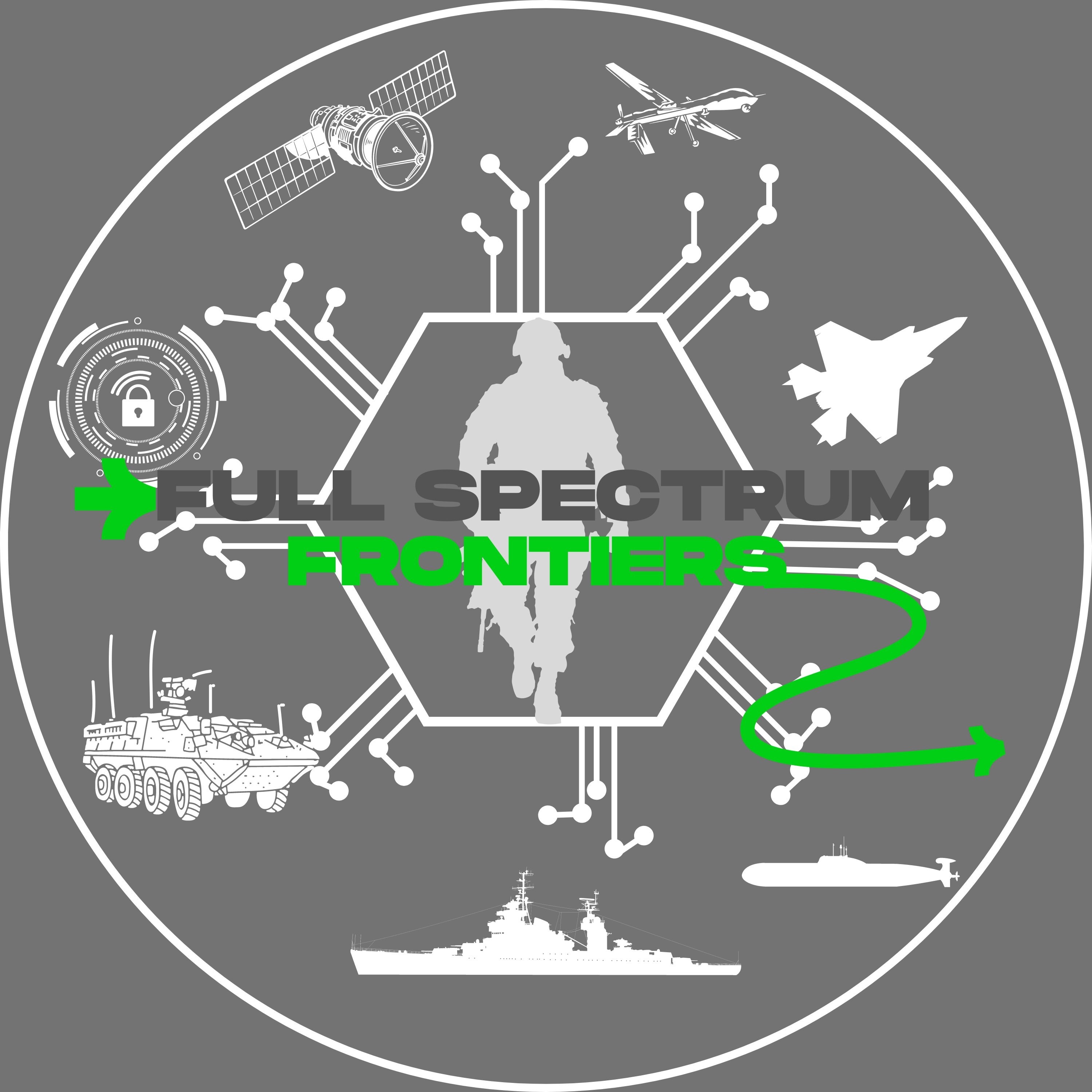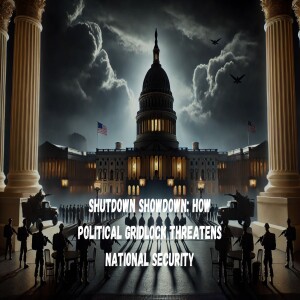The Full Spectrum Frontier’s Podcast

“Full Spectrum Frontiers” is a podcast that delves into the intersection of various significant themes such as manufacturing, the military, the economy, politics, American culture, and life. It explores how these areas are intertwined and how they influence and shape each other. The podcast aims to preserve, maintain, and highlight the essence of these interconnected topics, offering listeners in-depth insights and discussions. It’s a platform where complex and multifaceted issues are unpacked to understand their broader impact on society and individual lives.
Episodes
Episodes



Monday Dec 30, 2024
Lost at Sea: America’s Maritime Collapse and the Fight to Secure Our Future
Monday Dec 30, 2024
Monday Dec 30, 2024
The collapse of U.S. commercial shipping and shipbuilding has created a glaring vulnerability in national security. Once the backbone of global maritime dominance, America’s fleet and industrial base have been reduced to a shadow of their former strength. Meanwhile, China has aggressively expanded its naval and merchant shipping capacity, controlling critical trade routes and supply chains. This shift has jolted policymakers to confront the hard truth: without a strong maritime infrastructure, the U.S. risks losing its ability to project power, secure economic interests, and defend its shores. A maritime revival is no longer optional; it is a strategic necessity to preserve sovereignty and global influence.
Spotify
https://open.spotify.com/show/0IpcLT182C6UpnTpACL1HL?si=80c55f1f4b2041b0
Apple
https://podcasts.apple.com/us/podcast/the-full-spectrum-frontiers-podcast/id1752521325
YouTube
https://www.youtube.com/@FullSpectrumFrontiers



Monday Dec 23, 2024
Shutdown Showdown: How Political Gridlock Threatens National Security
Monday Dec 23, 2024
Monday Dec 23, 2024
Government shutdowns in the United States have become a political weapon, wielded by both parties to score points and force concessions. These manufactured crises grind essential government functions to a halt, jeopardizing national security as critical agencies like the Department of Defense and Homeland Security operate on skeleton crews or deferred budgets. Military readiness, intelligence gathering, and cybersecurity efforts are all compromised while politicians grandstand. The real cost isn’t just financial—it’s the erosion of public trust in government’s ability to protect and serve. When national security becomes collateral damage in a political standoff, the consequences ripple far beyond Washington.



Friday Dec 20, 2024
National Security Weekly Wrap-up EP1
Friday Dec 20, 2024
Friday Dec 20, 2024
In the week of December 12-19, 2024, three pressing U.S. national security issues dominate headlines. First, mysterious drone sightings across several northeastern states, including New York and Pennsylvania, have sparked concern, with the drones reportedly hovering near sensitive military installations and urban areas. Despite investigations by federal agencies, their origins and purpose remain unclear, raising fears of potential espionage or terrorism. Second, the Supreme Court has agreed to expedite hearings on the federal government's mandated divestment of TikTok, citing fears of Chinese surveillance through the app. This case pits national security concerns against First Amendment rights and could set a precedent for tech regulation. Lastly, revelations of an alleged Chinese espionage network targeting U.S. government and corporate entities have intensified debates on counterintelligence vulnerabilities. Reports indicate that key industries, including defense contractors, were infiltrated, prompting calls for stronger cybersecurity measures and stricter foreign access policies. These events underscore the evolving and multifaceted nature of national security threats facing the United States.



Monday Dec 16, 2024
Unidentified Drones Over the U.S.: Threats, Tech, and the Future of Security
Monday Dec 16, 2024
Monday Dec 16, 2024
The recent reports of drones over military bases in New Jersey, New York, and Pennsylvania bear striking similarities to incidents reported in Virginia last year. In both cases, the drones were described as larger and more sophisticated than typical commercial or hobby drones. These drones operated primarily at night, often hovering near sensitive military and infrastructure sites, and displayed advanced capabilities such as extended flight durations and precise maneuverability.
Key Similarities:
Size and Noise: Both sets of incidents involved drones described as larger and noisier than consumer models, suggesting commercial-grade or custom-built devices.
Flight Patterns: The drones exhibited coordinated behavior, with multiple drones seen flying in formation or systematically scanning areas.
Target Areas: In both instances, the drones were reported near high-security locations, including military installations, power lines, and other critical infrastructure.
Timing: The flights typically occurred during nighttime hours, making identification and tracking more difficult.
Lack of Identification: Despite extensive investigations, no clear origin or purpose has been determined for either set of incidents.



Friday Dec 13, 2024
Guardians of the Digital Frontier: A Conversation with David Beabout
Friday Dec 13, 2024
Friday Dec 13, 2024
Today on Full Spectrum Frontiers, we’re thrilled to welcome David Beabout, a seasoned expert in cybersecurity and information technology with over a decade of experience shaping the future of digital security. As a Global Chief Information Security Officer and leader in Customer Experience programs, David’s innovative approach is redefining how businesses and governments collaborate to address evolving cyber threats.
David’s passion goes beyond his professional expertise—he’s a champion for neurodiversity, a mentor to emerging talent, and a thought leader on national resilience against cyber attacks. With a Master’s degree from Johns Hopkins University and an impressive roster of certifications, he brings a wealth of knowledge to today’s discussion. Join us as we explore cybersecurity, leadership, and the ever-changing digital landscape with David Beabout.
Linkedin



Monday Dec 09, 2024
Monday Dec 09, 2024
The United States stands at a critical crossroads in semiconductor and chip manufacturing. These tiny yet powerful components are the backbone of modern technology, driving everything from smartphones to advanced defense systems. Dependence on foreign suppliers, particularly in geopolitically unstable regions, poses a significant threat to national security and economic stability. By investing in domestic chip production, the U.S. can mitigate supply chain vulnerabilities, safeguard critical infrastructure, and maintain a competitive edge in the global tech landscape. The stakes are clear: without a robust semiconductor industry at home, the future of American innovation and sovereignty is at risk.



Friday Dec 06, 2024
Friday Dec 06, 2024
Tony currently serves as a Sales, Business Development, and Corporate Strategy Executive with the Midwest MicroElectronics Consortium (MMEC). As an Air Force veteran with an impressive 22 years of military service, Tony has a deep well of experience in operations, acquisitions, and the development of advanced weapon systems—skills that seamlessly translate into his impactful work in the private sector.
Since transitioning from the military, Tony has been instrumental in the growth of three companies, guiding each from startup to successful acquisition by prime contractors. His strategic vision and ability to foster a proactive, positive corporate culture have consistently amplified company value and customer satisfaction, making him a force to be reckoned with in both military and civilian arenas.
Beyond his professional accomplishments, Tony is a passionate advocate for staying active, with hobbies ranging from hiking and running to golfing, swimming, and even gardening.
In today’s episode, we’ll dive into Tony’s unique journey—from shaping advanced weapon systems in the Air Force to building thriving businesses in the private sector—and explore how his leadership philosophy can inspire innovation and drive success in challenging environments.
Get ready for a conversation packed with actionable insights and stories of perseverance. Let’s get started!



Monday Dec 02, 2024
What Comes After Oil: The Future of Energy, Geopolitics, and Civilization
Monday Dec 02, 2024
Monday Dec 02, 2024
What comes after oil? The question isn’t just academic—it’s existential for a world built on fossil fuels. As reserves deplete and geopolitical tensions spike, humanity faces a critical inflection point. While renewables like solar and wind get the headlines, their scalability and reliability remain questionable without a leap in storage technology. Emerging contenders like nuclear fusion, hydrogen, and synthetic fuels promise solutions but face hurdles in cost and infrastructure. Meanwhile, nations scramble to secure rare earth minerals, the backbone of green tech, shifting the resource dependency from oil fields to mining pits. The post-oil era isn’t just about energy—it’s about rethinking the very foundation of modern civilization.







